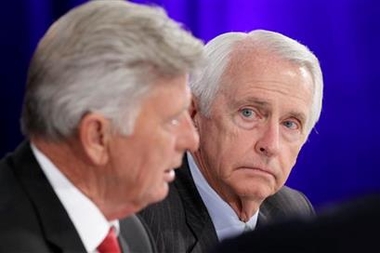Governors tout benefits of Medicaid expansion

Little Rock, Ark. (AP) — Three governors who expanded Medicaid under the federal health care overhaul said Saturday there are economic and moral arguments for embracing a key part of the law, despite strong political opposition in their southern states.
The Democratic governors of Arkansas, Kentucky and Maryland touted the success their states have seen in cutting the number of uninsured residents during a panel discussion at the Southern Governors' Association annual meeting in downtown Little Rock.
"Having more of our people with health care coverage is the right thing to do," Kentucky Gov. Steve Beshear said. "You're not going to have a productive workforce unless they're also a healthy workforce."
Arkansas and Kentucky had the highest drop in the number of uninsured residents in a Gallup poll released earlier this month. Arkansas saw a drop of about 10 percentage points in its share of uninsured residents, from 22.5 percent in 2013, to 12.4 percent by the middle of this year. Kentucky experienced a drop of nearly 9 percentage points in its share of uninsured residents, from 20.4 percent in 2013, to 11.9 percent.
Arkansas expanded Medicaid under a first-in-the-nation compromise plan approved last year that allows the state to use federal funds to purchase private insurance for newly eligible residents.
Dubbed the "private option," the program sharply divided Republicans in Arkansas, who have made gains over the past two elections after opposing the federal health law. The program needs at least three-fourths support from the Legislature to be renewed next year, and faces an uncertain future after a Republican architect of the program was defeated in a state Senate primary earlier this year.
More than 183,000 people are enrolled in Arkansas' private option. The program was narrowly reauthorized by the Legislature earlier this year.
Beebe, who is serving his last year in office, said the legislative threshold is difficult but that opponents also face a tough fight in trying to end a program that would still have support among a majority of legislators.
"Let's say that 26 percent don't want to do it and therefore you don't have the three-fourths," Beebe said. "What's that 74 percent going to do? Are they just going to roll over and play dead, stick their feet up in the air and say 'OK, you killed me. Let's all go home?' No."
Maryland Gov. Martin O'Malley said the successes the three states have seen in cutting uninsured rates and reducing hospitals' uncompensated care costs also help to make the argument for Medicaid expansion.
"You're going to see the people of those states that currently have run into some of the ideological roadblocks, you're going to see increasingly their provider communities — their doctors, their hospitals, their wellness professionals and their citizens — becoming aware that there is a better way to keep people well and to reduce the cost," O'Malley said after the panel discussion.
by Andrew DeMillo, Associated Press
Copyright 2014 The Associated Press. All rights reserved. This material may not be published, broadcast, rewritten or redistributed.
The Gayly – August 17, 2014 @ 3:15pm





